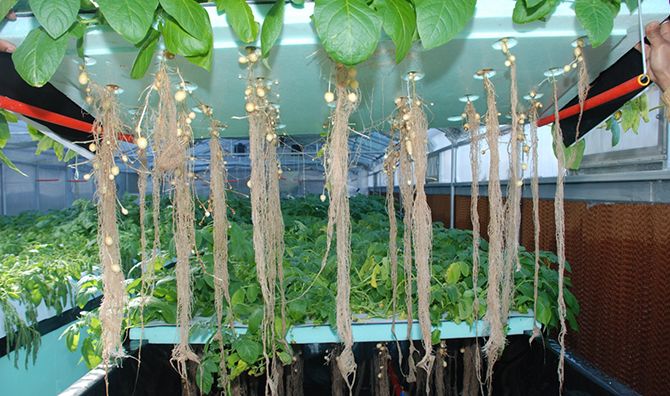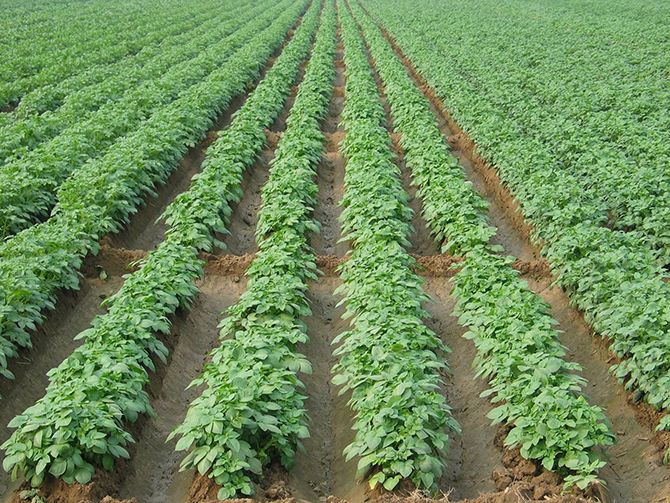The technology for producing healthy potato seeding material through aeroponic system, which has already been passed on by the CPRI to about 18 entrepreneurs, would expedite multiplication of seeds of potato, including those of the specialty potatoes, to promote their cultivation, says Surinder Sud.

Potato scientists are reworking the nutritional profile of this third largest consumed food, next to rice and wheat, to place it in the "health foods" category.
For this, they are trying to enhance potato's innate content of antioxidants (anti-cancerous) and anti-diabetic ingredients.
Efforts are also on to promote the hi-tech systems of seed production through aeroponic (soil-less) and tissue culture (test tube) techniques.
This would help save time and cost of producing disease-free and good quality seeding material to mitigate the shortage of certified potato seeds.

Potato pundits, in any case, do not view it as an unhealthy food.
Shimla-based Central Potato Research Institute (CPRI) director S K Chakrabarti dismisses the notion that potato intake heightens the risk of weight gain.
For, potato is very low in fat content, just 0.1 per cent.
It also contains enzymes and other ingredients which improve insulin secretion in human beings to take care of its high carbohydrates content.
The protein in potato, even if merely around 2.5 per cent on fresh weight basis, has a very high biological value.
All amino acids are present in right proportion with a relatively higher share of vital lysine.
In this respect, potato protein is rated higher than the proteins in products of animal origin, such as milk and meat.
Moreover, potato is rich in vitamins C and B and several useful minerals.
In fact, the seafarers of olden days ate potato to avoid scurvy, a Vitamin C-deficiency disease that caused swelling and bleeding of gums and reopened previously healed wounds.

The anti-diabetic compounds and antioxidants found in potato, which are now sought to be augmented through bio-fortification, are believed to play a role in slowing down or preventing diseases ascribed to ageing.
An increase in the anti-diabetics ingredients of potato, such as biguanide and metformin, is expected to improve the insulin production to combat type-II diabetes.
In laboratory studies, diets containing powder of potatoes of Kufri Surya variety have been found to lower the blood sugar levels of diabetic rats.

Antioxidants, on the other hand, are the chemicals which subdue cell-damaging "free radicals" to impede and possibly thwart the development of many dreaded maladies, including cancer.
Main anti-oxidants found in potato are phenolics, anthocyanins, flavonoids and carotenoids.
The CPRI is endeavouring to develop potato strains having higher content of anti-oxidants like anthocyanins and carotenoids.
These potatoes would have coloured tubers.
In fact one such anti-oxidant-rich dark purple-coloured potato variety, Kufri Neelkanth, has already been released about a year ago for cultivation in the northern plains.
It yields, on an average, about 38 to 40 tonnes of potato tubers per hectare, against the present national average of 23 to 24 tonnes.
More such anti-oxidants-dense coloured varieties of potato having cancer-inhibiting traits are likely to be released in the next few years.

The technology for producing healthy potato seeding material through aeroponic system, which has already been passed on by the CPRI to about 18 entrepreneurs, would expedite multiplication of seeds of potato, including those of the specialty potatoes, to promote their cultivation.
In fact, the seeds multiplied through vegetative route (read, clones) with the help of these techniques would facilitate raising the country's overall potato production to meet the rapidly growing demand.

These and other scientific breakthroughs in potato cultivation achieved by potato researchers in India and abroad are slated to be highlighted in the forthcoming Global Potato Conclave 2020 scheduled to be held at Gandhinagar, Gujarat, from January 28 to 31.
This conclave is being organised by the Indian Potato Association in collaboration with the Indian Council of Agricultural Research, the CPRI and the Lima (Peru)-based International Potato Center.
The Netherlands will be the exclusive country partner.
The three major components of this mega event -- Potato Conference, Agri-Expo and Potato Field Day -- will enable the scientists, traders, processors, value-chain managers and potato growers to interact with each other.
Apart from learning about the latest developments in the potato sector, these stakeholders would get an opportunity to strike business deals as well.














 © 2025
© 2025